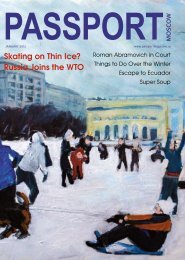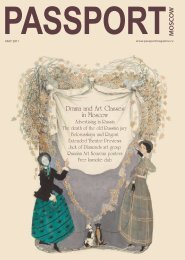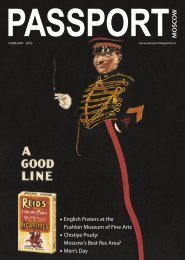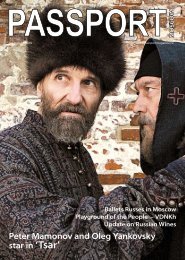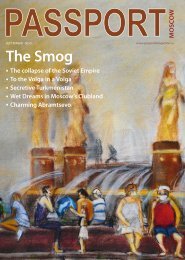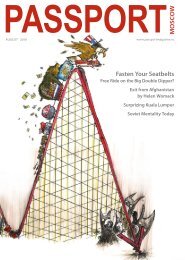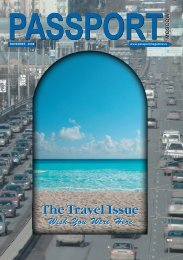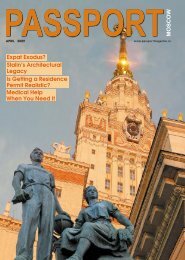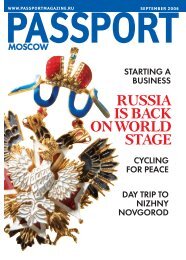M O S C O W Interview with Leonid Shishkin - Passport magazine
M O S C O W Interview with Leonid Shishkin - Passport magazine
M O S C O W Interview with Leonid Shishkin - Passport magazine
Create successful ePaper yourself
Turn your PDF publications into a flip-book with our unique Google optimized e-Paper software.
Education<br />
Do Russians push<br />
their children too hard?<br />
The pressure’s on for<br />
Russian kids this month,<br />
as they cram for exams<br />
while keeping up a host of<br />
extracurricular activities.<br />
And the holidays won’t see<br />
an end to their labours,<br />
as they are packed off<br />
for extra lessons at camp.<br />
While the gifted can cope<br />
<strong>with</strong> the most gruelling of<br />
schedules <strong>with</strong> a smile,<br />
others will struggle. Are<br />
their childhoods being<br />
sacrificed to the modern<br />
age need to succeed?<br />
Text by Peter Ellis<br />
“I do it every day and I hate it. I really<br />
don’t want to do karate but my mum<br />
says I’ve got to,” says Pasha. With his<br />
soft brown eyes, wavy brown hair, trust-<br />
2 June 2010<br />
ing face and all of his eleven years, he<br />
doesn’t look like a killer. I ask him why<br />
he thinks his mum makes him do it.<br />
“To make me strong. Men have to be<br />
strong,” he replies <strong>with</strong> a weak smile.<br />
Pasha’s sister Sasha, 13, shares the<br />
same woes. “And I’ve been doing it for<br />
two year’s longer than him,” she whimpers.<br />
The kids are two of my students,<br />
who have been booked in for extra English<br />
lessons by their concerned mother,<br />
though their English is well in advance<br />
of their years. We talked about their daily<br />
routine: these school children have<br />
schedules which would make an international<br />
executive’s head spin.<br />
Sasha and Pasha aren’t alone in being<br />
busy. At weekends another of my students,<br />
Alex, goes to boot camp, where<br />
the day starts before breakfast <strong>with</strong> a<br />
five kilometre run <strong>with</strong> a heavy backpack,<br />
while during the week his free time<br />
is taken up <strong>with</strong> extra English, Spanish,<br />
and the martial arts. His father is hoping<br />
to get him into the FSB: a Russian James<br />
Bond in the making. But this seems part-<br />
time compared to one of my colleague’s<br />
twelve-year-old charges. She doesn’t go<br />
to school except to take exams and is ferried<br />
from tutor to tutor in a seven-day-aweek,<br />
twelve-hours-a-day regime. “My<br />
mum thinks I’m a genius,” she explains,<br />
though recently she has managed to negotiate<br />
some Sundays off.<br />
Even when school’s out, lessons don’t<br />
stop for many of Moscow’s youngsters.<br />
Busy working parents can relax knowing<br />
their offspring are being taken care<br />
of at a host of summer camps.<br />
“It’s great being a away from home<br />
and <strong>with</strong> my friends. We had great fun<br />
especially in the evening when we had<br />
free time,” says Andrei, another of my<br />
students who attended a two-week ‘bio<br />
camp’ last July, where he was taught<br />
woodland ecology, followed by a fourweek<br />
language course in the UK.<br />
Much of this extracurricular learning<br />
is organised by the youngsters’ schools,<br />
where they can experience the sort of<br />
practical activities that UK schoolchildren<br />
take for granted, though there




